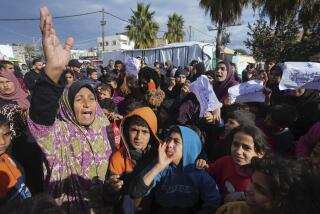2 Chinese Villages Battle Over Hometown Hero--and Tourist Cash
Jiang Zhenzhong stopped the clock at 11:05 a.m. and fixed the calendar at May 30, 2001.
That was the moment the most powerful man in the world’s most populous nation had graced this peasant’s living room.
“He sat for 18 minutes and ate three peanuts,” Jiang recalled. “I saved the shells.”
President Jiang Zemin dropped by last year during a tour of Jiangxi province. The region had made headlines with scandalous reports of schoolchildren, forced to make fireworks, dying in a horrific explosion.
But the Communist Party chief’s entourage put the region on the map for a different reason--a visit to his ancestral home.
It’s nothing short of divine intervention for this economically strapped inland province.
Most residents in this little-known village proudly share their president’s last name, which means Big River. They’re betting on the Jiang connection to bring them fortune and fame, through lots and lots of tourists.
The only problem is, exactly where the president’s ancestors actually lived remains a mystery.
Another village, Jiangcun, in neighboring Anhui province, insists that it’s the real thing.
“We are his ancestral home, I’m 200% sure,” said Huang Jun, a Jiangcun official.
Jiangwan begs to differ. “Chairman Jiang is a descendant of Jiangwan, that’s undeniable,” said Wu Yuangen, a tourism manager in the village.
Blame the confusion on history.
The Chinese traditionally kept detailed records of their roots. But during the 1966-76 Cultural Revolution, precious genealogy books were destroyed, as well as the family temples that give clues to one’s past.
It doesn’t help that the president was born in coastal Jiangsu province. His grandfather had moved there from somewhere along this picturesque mountain valley, in the border region between Jiangxi and Anhui provinces.
The area is blessed with lush green forests and graceful rural architecture. Its chalk-white walls and charcoal-colored roofs were featured in the movie “Crouching Tiger, Hidden Dragon.”
During his visit here, the president downplayed his family connection. Since the death of Communist founding father Mao Tse-tung, Beijing has considered the cult of personality taboo.
Because of that, locals are prohibited from selling any trinket with a portrait of the president or flaunt his kinship, even though the government supports tourism as a new cash cow for poor farmers.
Local officials carefully scrutinize all publicity materials, keeping them deliberately vague. A large mural of the president visiting a local school greets tourists at the entrance to the village. Its slogan reads simply: “Together with Grandfather Jiang.” A guidebook describes Jiangwan as “Home of a Great Man.” But it doesn’t name names.
What prompted Chairman Jiang’s search for his roots? Ordinary people will probably never know. But they have their guesses.
According to one version, the president had planned to look for his ancestral home after he steps down next year as China’s top boss. But a few years ago, devastating floods around the country apparently sent him scrambling for help from unusual sources. A Buddhist priest reportedly told him that he was a dragon (Chinese symbol for emperor) and a river (his name). Both water signs. The only way to stop the flooding, he was told, was to pay respects to his ancestors. Thus the journey back to his roots.
This of course can’t be the official story, because the Communists are atheists and opposed to any kind of superstition.
But the tour did fuel the competition between Jiangcun and Jiangwan, which mean, respectively, River Village and River Bay. The president visited both villages.
“Chairman Jiang read the Jiang family registry and visited the Jiang family temple,” said Huang, the Jiangcun official. “We have solid proof. Jiangwan has nothing.”
He’s partly right.
Most physical connections to Jiangwan’s No. 1 son no longer exist. But villagers claim to have enough historic evidence, based on oral history of village elders and the president’s relatives, to know that they are the authentic branch of the Jiang clan.
“They can say whatever they want,” said Jiangwan’s Wu. “If you don’t believe me, ask Chairman Jiang.”
That, apparently, isn’t necessary (or, for that matter, possible). Thousands of tourists have already flocked to Jiangwan to peek at farmer Jiang Zhenzhong’s house, sit in the hard wooden chair where the president sat and imagine for a moment what it’s like to be a modern emperor.
The mansion in Jiangwan that Jiang’s ancestors supposedly built collapsed more than 20 years ago. Only overgrown bush and broken stones remain. The original occupants of the Jiang family mansion were condemned as “landlords” and kicked out after the Communist revolution in 1949. Eight peasant families moved in.
“After some of the walls started to crumble, we tore down the rest of the house, sold the good timber and burned the rest,” said Jiang Changrui, who was born in the house 49 years ago.
Another vanished landmark is the ancestral temple for this branch of the Jiang clan.
The Communists turned the grand house of worship into the village headquarters. Then the people’s commune leader bulldozed it and replaced it with something more suitable for the proletariat.
Thanks to the presidential visit, Jiangwan’s leaders are trying to undo the past. A new multimillion-dollar family temple and mansion are on their way up.
For poor peasants who suddenly found the path to new wealth, it’s the faith that matters.
“No one knows for sure where he’s from,” confessed Jiang Changrui, who hawks antique pottery. “Even Chairman Jiang has asked us to stop guessing.”
More to Read
Start your day right
Sign up for Essential California for news, features and recommendations from the L.A. Times and beyond in your inbox six days a week.
You may occasionally receive promotional content from the Los Angeles Times.






